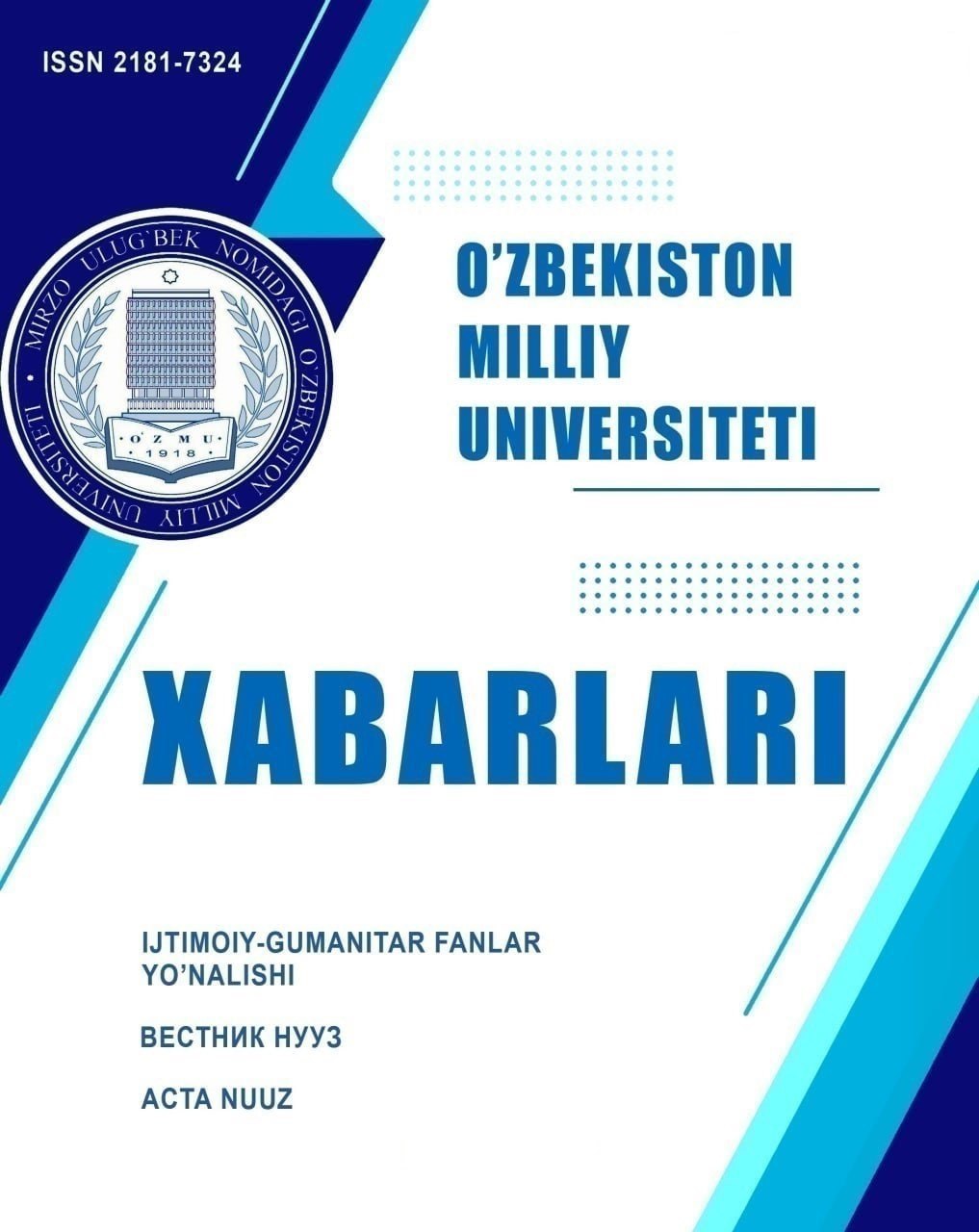XITOY VA BOSHQA DAVLATLARDA RUS TILI O‘QITISH METODIKASI XITOY VA RUS TILLARIDAN YOZMA TARJIMA KOMPETENSIYASINI O‘RGATISH (XITOY XALQ RESPUBLIKASI MISOLIDA)
##plugins.pubIds.doi.readerDisplayName##:
https://doi.org/10.69617/uzmu.v1i1.4.1.2142
"Kalit so‘zlar"
:
Texnologiya, metodika, o‘quv dasturi, milliy til, davlat tili, g‘oya, milliy til, pedagogik tuzilma, pedagogik iboralar, pedagogik g‘oyalar.
"Maqola"
Ushbu maqola aslida Xitoy misolida xitoy tilini o‘rgatish imkoniyatlarini taqdim etdi. U kiber tahdidlar masalasiga alohida to‘xtalib o‘tdi. Rus tilini o ‘qitish usullariga tahdid boshqa davlatlar o‘rtasidagi kelishmovchilikning sababi sifatida ko ‘rilmoqda.
References
1. Fu, Ke, 2004: The History of Foreign Language Education in China, Shanghai: Shanghai Foreign,Language Press.
2. Hao, Shichang, and Yachen Li, 2001: A Brief History of the Chinese Craze for Studying in the
3. Li, Jing jie, 2019: “Seventy Years of China-Russia Relation”, Russian, East European & Asian
4. Studies 4, 7-8.
5. Liu, Limin, 2011: Russian Language Education in the New China, Shanghai: Shanghai Foreign, Language Education Press.
6. Liu, Limin, 2017: “Russian Language Education in China: Inheritance and Development”, Russian in China 1, 1-7.
7. Ning, Qi, 2018: “Building ‘the Belt and Road’ and Cultivating Russian Language Talent at Universities” in Young quan Li and Xiao quan Wang (eds.): Russia, Central and Eastern Europe.
8. NOMÁZEIN | Special Issue IX – Foreign Languages Education in China: Current Situation...: 20 – 37.
9. Qi Ning. The interaction of foreign languages and society: a review of Russian language education in China 37
10. Central Asia and the World: A Selection of High-level Dialogues (No.1), Beijing: Social Sciences Academic Press, 181-182.
11. Ning, Qi, and Ming bin Li, 2018: “Translation of Canonical Literature: Its Role in Sino-Russian. People-to-people and Cultural Exchange”, Journal of New Silk Road 3, 86.
12. Shen, Qi, 2019: “China’s Planning for Foreign Language Education in 70 Years: Shifts in Paradigm and Strategy”, Journal of Xinjiang Normal University (Philosophy and Social Sciences. Edition) 5, 69.
13. Sun, Yuhua, and Hong Liu, 2009: “A Study on the Development of Russian as a Discipline” in Weidong Dai and Wenzhong Hu (eds.): Foreign Languages Education in China: 1949-2009, Shanghai:
14. Shanghai Foreign Language Education Press, 198-200.
15. Wang, Jinrong, and Hongzhong Xia, 2011: “Periodical Features of Russian Language Education in the Early Years of New China: Analysis and Reflection”, Russian in China 2, 2-8.
16. Wang, Jinrong, 2010: “An Analysis on the Past and Present Situation of Russian Language Education in China”, Journal of Sichuan University of Science & Engineering (Social Sciences Edition) 3, 95-98.
17. Wang, Mingyu, 2005: “Russian Language Teaching in China: History, Present and the Development Strategy”, Russian Language and Literature Studies 3, 1-13.
18. Wang, Mingyu, 2006: “A Discussion on the Development of Russian Language Education in China”, Russian in China 1, 14-18.
19. Wang, Yangzheng, 2010: “A Reflection on Russian Language Education after the ‘Year of Russian’”, Russian in China 1, 6.
20. Yan, Hongbo, 1999: “Features of Russian Language Teaching in China: A Historical Perspective”,Russian in China 4, 2-8.
2. Hao, Shichang, and Yachen Li, 2001: A Brief History of the Chinese Craze for Studying in the
3. Li, Jing jie, 2019: “Seventy Years of China-Russia Relation”, Russian, East European & Asian
4. Studies 4, 7-8.
5. Liu, Limin, 2011: Russian Language Education in the New China, Shanghai: Shanghai Foreign, Language Education Press.
6. Liu, Limin, 2017: “Russian Language Education in China: Inheritance and Development”, Russian in China 1, 1-7.
7. Ning, Qi, 2018: “Building ‘the Belt and Road’ and Cultivating Russian Language Talent at Universities” in Young quan Li and Xiao quan Wang (eds.): Russia, Central and Eastern Europe.
8. NOMÁZEIN | Special Issue IX – Foreign Languages Education in China: Current Situation...: 20 – 37.
9. Qi Ning. The interaction of foreign languages and society: a review of Russian language education in China 37
10. Central Asia and the World: A Selection of High-level Dialogues (No.1), Beijing: Social Sciences Academic Press, 181-182.
11. Ning, Qi, and Ming bin Li, 2018: “Translation of Canonical Literature: Its Role in Sino-Russian. People-to-people and Cultural Exchange”, Journal of New Silk Road 3, 86.
12. Shen, Qi, 2019: “China’s Planning for Foreign Language Education in 70 Years: Shifts in Paradigm and Strategy”, Journal of Xinjiang Normal University (Philosophy and Social Sciences. Edition) 5, 69.
13. Sun, Yuhua, and Hong Liu, 2009: “A Study on the Development of Russian as a Discipline” in Weidong Dai and Wenzhong Hu (eds.): Foreign Languages Education in China: 1949-2009, Shanghai:
14. Shanghai Foreign Language Education Press, 198-200.
15. Wang, Jinrong, and Hongzhong Xia, 2011: “Periodical Features of Russian Language Education in the Early Years of New China: Analysis and Reflection”, Russian in China 2, 2-8.
16. Wang, Jinrong, 2010: “An Analysis on the Past and Present Situation of Russian Language Education in China”, Journal of Sichuan University of Science & Engineering (Social Sciences Edition) 3, 95-98.
17. Wang, Mingyu, 2005: “Russian Language Teaching in China: History, Present and the Development Strategy”, Russian Language and Literature Studies 3, 1-13.
18. Wang, Mingyu, 2006: “A Discussion on the Development of Russian Language Education in China”, Russian in China 1, 14-18.
19. Wang, Yangzheng, 2010: “A Reflection on Russian Language Education after the ‘Year of Russian’”, Russian in China 1, 6.
20. Yan, Hongbo, 1999: “Features of Russian Language Teaching in China: A Historical Perspective”,Russian in China 4, 2-8.
Nashr qilingan
2024-04-18
How to Cite
Zulhayat AMANULLA. (2024). XITOY VA BOSHQA DAVLATLARDA RUS TILI O‘QITISH METODIKASI XITOY VA RUS TILLARIDAN YOZMA TARJIMA KOMPETENSIYASINI O‘RGATISH (XITOY XALQ RESPUBLIKASI MISOLIDA). O‘zMU Xabarlari, 1(1.4.1), 58-61. https://doi.org/10.69617/uzmu.v1i1.4.1.2142
"Bo'lim"
Maqolalar


.jpg)

.png)







